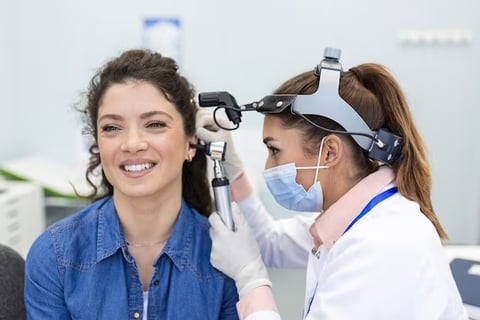Add your promotional text...
Doctor of Audiology AuD
Eligibility, Course description, Universities offering
Ms. Arpita Chatterjee Shahi
9/9/20232 min read
The Doctor of Audiology (Au.D.) is now the first professional degree for audiologists and is rapidly becoming the required degree for entry into the practice of Audiology in state licensure statutes, as these laws come up for review in the legislative cycle. Previously the Master’s degree was the clinical degree required for entry into the profession; however, as of late 2006, there are no longer any Master’s degree training programs for audiologists in the United States.
A professional doctorate is the highest post-baccalaureate degree given in a particular profession for the purpose of clinical practice. This is in contrast to the Ph.D. degree which is earned and awarded to students pursuing careers in research and academia. Ph.D. candidates may have previously earned the Au.D. Degree if they were practicing audiologists.
Present Scenario
Today, there are more than 70 programs offering a residential Au.D. Degree and efforts continue to strengthen the educational curriculum and training experience through a strong accreditation body that is independent of any membership organization. It is our hope that through this process (helped along with some consolidation), fewer (but more robust) professional programs will emerge to train future Doctors of Audiology.
The AuD is the designator for the professional doctorate in the discipline of audiology.
Completion of the degree typically requires four years of full-time study beyond the bachelor's degree. An individual should check with the AuD program of their choice to find out the specific prerequisite coursework to be completed at the bachelor's level.
Individuals completing this degree are prepared for independent clinical practice in areas of auditory and vestibular assessment and treatment and reimbursement from third-party payers for these services.
Individuals completing an AuD will be prepared to be leaders of the field and will be competent to interact with other doctoring professions involved in hearing health care.
Individuals completing an AuD will be critical consumers of research and may choose to participate in clinical research including the evaluation of the efficacy of current diagnostic and treatment strategies.
Individuals interested in pursuing an independent research program and teaching at the university level should obtain a PhD, which is considered the entry-level degree for research. It is essential to have well-qualified PhDs who create the scientific base of a profession. Without a research base, there is no profession to practice. It is important for researchers (PhDs) and clinicians (AuDs) to interact to bring science into the clinic and to instruct the scientists in what questions must be answered for excellent clinical practice.
In most states, an audiologist must hold a license to legally practice. Individuals completing an AuD program should be prepared to meet the requirements of licensing.
State wise information offered by Universities in USA:
https://www.audiologist.org/students/prospective-students/audiology-programs


